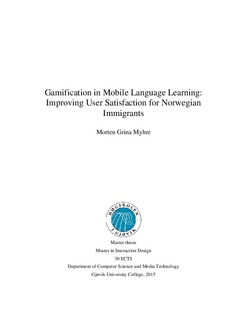Gamification in Mobile Language Learning: Improving User Satisfaction for Norwegian Immigrants
Master thesis
Permanent lenke
http://hdl.handle.net/11250/295939Utgivelsesdato
2015Metadata
Vis full innførselSamlinger
- Institutt for design [1096]
Sammendrag
During the previous years, technology has been used for assisting immigrants with language learning in Norway. Using technology to teach languages contributes to increased effectiveness in learning for students. Students perceive this as more fun. Now that mobile devices have been developed to the point that they are powerful mini-computers, the potential for learning with these devices is getting bigger. That means people can learn by using interactive technology whenever and wherever they would like to, using their own personal devices. M-learning is used to define the applications that are used on mobile devices to assist learning. Using m-learning is evidently increasing motivation for learning. To further increase motivation, gamification can be used as a design approach. The target group in focus of this thesis is immigrants in Norway that currently learns the Norwegian language. The thesis focuses on how to implement gamification in mobile language learning applications, and if this affects the students satisfaction during learning. Initially, qualitative user studies were used to gather an understanding of the current situation on e-learning in Norway - how e-learning is currently used, and how receptive the current students were towards a digital alternative to learning. After this information was gathered and a prototype was designed, an experimental design was developed and conducted. Data was gathered to form the hypothesis and result of the thesis. The thesis concluded with that gamification, even though it pointed to increased satisfaction, could not increase the users perceived satisfaction.
